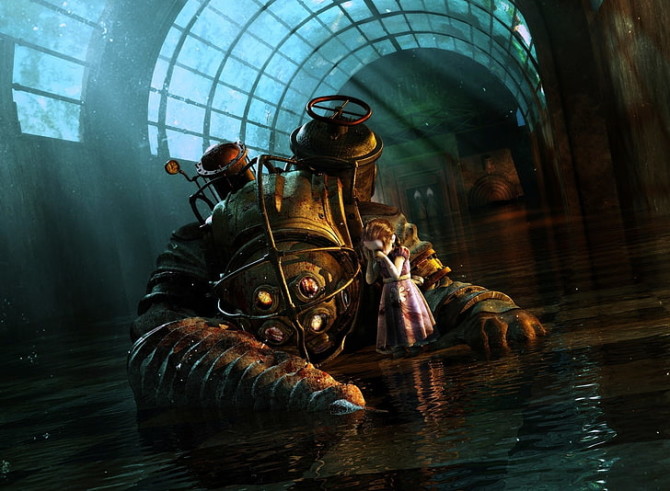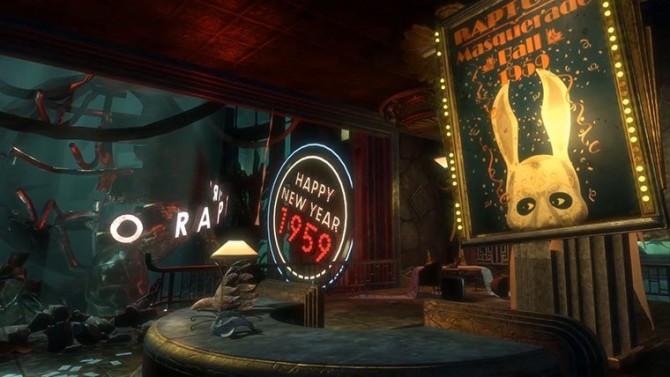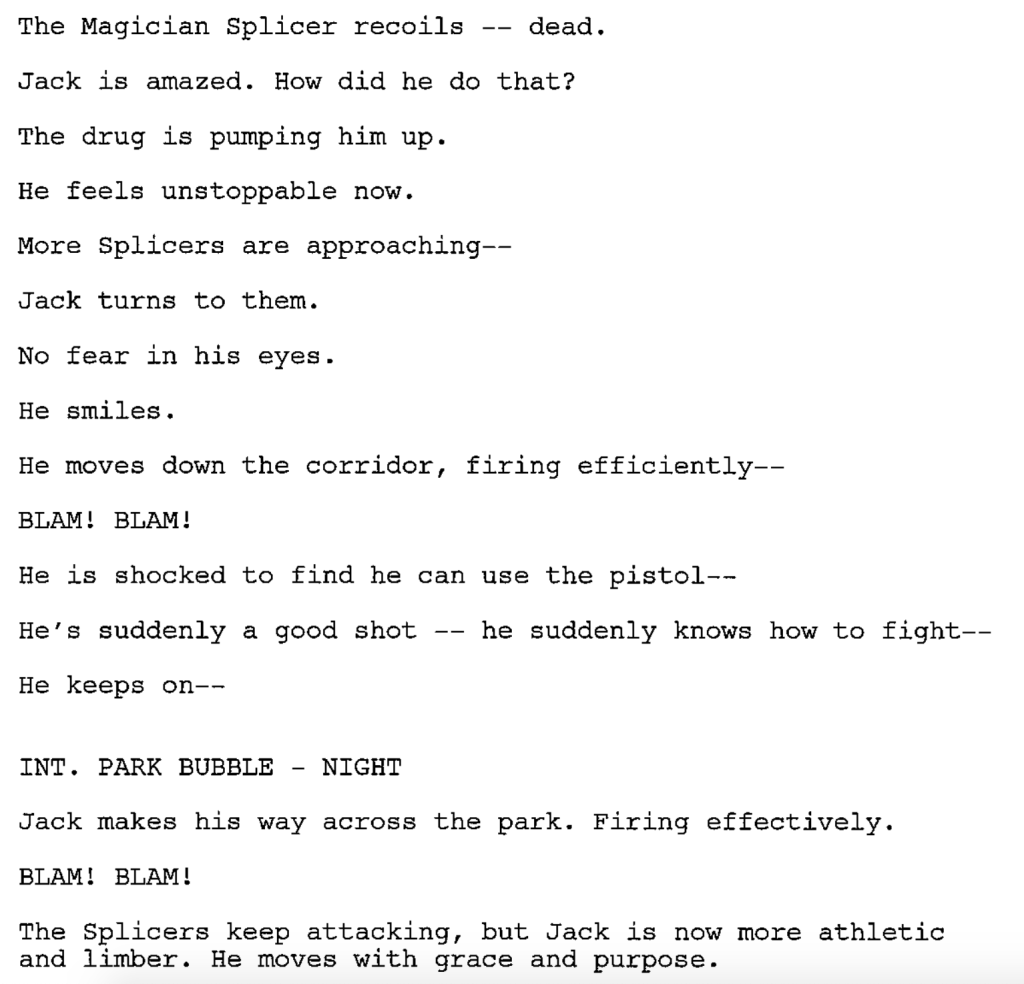Genre: Sci-Fi/Horror
Premise: After his plane crashes, a man finds himself stuck in a giant deserted 1950s city at the bottom of the ocean.
About: Bioshock was heading towards production a decade ago when, just weeks before shooting started, it was cancelled. But according to lore, it was not cancelled because they couldn’t get the script right. It was cancelled because the studio got nervous about a 200 million dollar R-rated film, particularly when there had been so many high profile video game adaptation failures recently. For all intents and purposes, the script might have been great. You think that with content hungry streamers desperate to find the next big thing, Bioshock is going to find a home at some point, likely as a series.
Writer: John Logan (Gore Verbinski was set to direct)
Details: 111 pages
I’m trying to inspire you guys with some A-grade sci-fi world-building here.
John Logan is a fascinating screenwriter. He’s credited with over a dozen high profile studio movies (Skyfall, Alien: Covenant, Hugo, Sweeney Todd, The Aviator, The Last Samurai, Star Trek: Nemesis, The Time Machine, etc.). Yet he doesn’t have a single movie that you actually remember and want to revisit (with the exception of, maybe, Gladiator). In many ways, he’s the ultimate studio screenwriter. And what I’m going to try and do today is figure out what John Logan does to be so perfectly suited to write big budget studio movies.
Let’s take a look.
The opening to Bioshock is basically the opening to The Graduate. So much so that they might be able to save money just by buying the dailies to the Mike Nichols film. It’s 1960. A guy name Jack just graduated college. His rich father wants him to join the firm. We see his graduation party with all his dad’s friends, many of them obsessed with their golf swings. His father takes him to work the next day, shows him his pathetic little office, and Jack has a mental breakdown. There is no way this is going to be his life.
Cut to Jack on a Pan Am flight to Barcelona. Jack doesn’t have a game plan once he lands in Barcelona. He just knows that he wants to get as far away from Mrs. Robinson as possible. Luckily, he won’t have to figure it out because his plane crashes Castaway style. Jack survives and swims to a lighthouse. But, once inside, he finds himself being shot down into the ocean via an elevator and arriving in a giant underwater city from the 1950s.
The place is dilapidated with debris and puddles everywhere. After watching a monster creature slice a young mother apart, Jack runs into an Irish guy named Atlas who’s one of the last people in the city not to have turned into a crazed monster. He tells Jack there’s a sub on the other side of the city. That’s the only way out of here. And so off they go, across this monster-infested cesspool, to try and get out.
Along the way, Jack sees a lot of curious things. For example, when he stumbles into a “Leave it to Beaver” household, he sees a picture of his dog from back home on the refrigerator. What’s going on? We get the sense that there’s a mystery to be solved here and that his new “friend,” Atlas, may be hiding the answers from him. Which means Jack will have to decide whether to trust him or figure his own way out of this hellhole.
I think I found what I was looking for regarding how John Logan became the ultimate studio screenwriter. He understands a simple truth – that everybody loves easy-to-read scripts. That means scripts that are clean and sparse on the page. He only writes what is necessary. Nothing more. And he favors vertical screenwriting (the act of writing a bunch of short sentences so the eyes fly down the page “vertically”) when possible.
I’ve always thought that the only purpose for easy-to-read scripts was to placate spec screenplay readers. You’re a nobody writer. You’re trying to keep the attention of overworked readers who are reading your script at the end of their days. It makes sense to keep the writing as sparse as possible.
Conversely, you shouldn’t need to do this as a studio screenwriter. In Logan’s case, he’s working directly with producers and directors. He’s not having to work his script up the industry ladder, winning over reader after reader after reader. If he wanted to write 8 line paragraphs for 150 pages straight, he could do that.
So why doesn’t he?
Maybe the reason Logan is so successful is because he keeps the spec screenwriter mindset as a professional. If Gore Verbinski thinks, “Wow, John’s scripts are so much easier to read than that last writer I hired,” he is more likely to hire him again. Right?
Just to be clear, there is no correlation between “easy-to-read” scripts and “a good movie.” In fact, if there’s any correlation, it’s a negative one. The less words you put on the page, the less you have to go on when making the film. That’s the paradox of screenwriting. The way to write a successful screenplay is not always the way to write a successful movie.
But John seems to understand that the most important job of a Hollywood screenwriter is to keep your bosses happy. Make their jobs as easy as possible. Why write some 150 page opus with 65 characters, multiple timelines, and constantly shifting narratives that you’ll need a 10 hour Zoom call to explain when you can write these easy effortless scripts that everybody reads and thinks, “Wow, that was enjoyable.”
I admit I may be oversimplifying things but I think there’s something to this.
Because, as a movie, this story isn’t very good. It’s kind of stuck between a sci-fi script, a horror film, a supernatural film, and an all out zombie flick. I think that works in the video game world where all you want to do is be scared and shoot cool-looking creatures. But when you smash all of that stuff into a movie script, it feels a bit “everything and the kitchen sink.”
I think this would’ve worked best if they ditched the action. I know that sounds crazy but the coolest thing about this world is how spooky it is. A straight-up mystery built inside a creepy abandoned city is all you need. Injecting stupid blue liquid into our veins to become stronger and fighting off giant creatures… that’s great for video games. Dumb for movies. I suppose you could argue that Aliens balanced action with horror. But Aliens wasn’t a mystery about a singular person who got stuck inside a mysterious city. It’s entire concept was built around action (a group of military men head to a base infested with aliens).
The underwater setting of this movie is so cool that it ALMOST offsets the script’s weaknesses. But, in the end, like the creatures of Bioshock, there are too many of those weaknesses to overcome. I would probably check this movie out if it showed up on Amazon. But I’m not convinced I would make it through the entire thing.
Script link: Bioshock
[ ] What the hell did I just read?
[x] wasn’t for me
[ ] worth the read
[ ] impressive
[ ] genius
What I learned: Utilize GENUINE CURIOSITY to camouflage exposition. In order to get inside Jack’s head about why he’s moving to Barcelona, Logan introduces a flight attendant who Jack starts flirting with. They get to talking and the flight attendant is genuinely curious about Jack’s life. This is the ideal time to slip in exposition because any questions the attendant asks will be genuine. She likes him. She wants to know about him. So when she asks “Why Barcelona” and Jack explains what led to the choice, it doesn’t feel at all like exposition is being doled out. It feels like two people getting to know each other. Conversely, if Jack had initiated his reasons for going to Barcelona on some random person sitting next to him in the plane, it would’ve felt like Exposition City.




